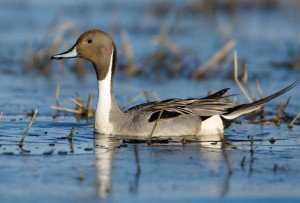BISMARCK, N.D. — For 75 years, science has been the cornerstone of Delta Waterfowl. Research shapes the conservation programs and management policies that help put more ducks in the air, year after year.
“It’s been our history — research defines what we do,” said Dr. Frank Rohwer, Delta Waterfowl’s president. “Research drives us and our programs, and it should always drive wildlife management. We’re committed to finding things that work.”
From duck studies to hunter satisfaction to land management, Delta Waterfowl researchers employ cutting-edge technology and science to find the breakthroughs that will shape the future of waterfowl management.
Here are the research projects that Delta is currently working on or collaborating with partners to complete.
- California Water Scarcity: California’s water supply is highly controlled, leaving little for ducks and geese. As partners with University of California-Davis and the U.S. Geological Survey, this study probes how less water will affect wintering waterfowl populations and ultimately, could influence future water policies.
- CRP and Landowner Attitudes: To the detriment of ducks, the Conservation Reserve Program is slowly disappearing, partly because of waning participation. This study will shed light on the views of farmers and ranchers, and how conservation management programs can be improved.
- Predator Management: Results from 2012 demonstrated the effectiveness of predator management in the parklands of Manitoba and areas of low nesting cover in North Dakota — both known for chronically low nest success. This ongoing study continues to explore the effectiveness of trapping predators and their relationship with nesting ducks.
- Mottled Duck Management: Mottled duck breeding success is low along the Gulf Coast — but not on manmade islands in Louisiana’s Atchafalaya Basin. Delta researchers are studying predators and vegetation to learn why.
- Pacific Flyway Mallards: The goal is to update data on where Pacific Flyway mallards breed and nest so future conservation and management efforts can strategically target specific habitat. Delta is partnering with Dr. Todd Arnold of the University of Minnesota.
- Chesapeake Bay Phragmites: Phragmites compete against desirable native North American plants, negatively affecting wetlands and waterfowl. Delta is partnering with researchers at Utah State University to find out how to best manage these invasive species.
- Wood Duck Harvest: When bag limits increase or decrease, what are the consequences on duck populations? This study in Nevada by Dr. Chris Nikolai monitors wood ducks as various hunting regulations are experimentally manipulated.
- Winter Habitat and Breeding Ducks: In the 1980s, research found a relationship between winter habitat conditions in the lower Mississippi Valley, and breeding success the following spring. This study partners with researchers at the University of Georgia to update the data to see if the same patterns exist today.
- ALUS Evaluation: Delta’s Alternative Land Use Services has shown great promise as a means to conserve and enhance Canadian wetland habitat. Several ongoing evaluation projects will test effectiveness and landowner reaction.
- Hunter Satisfaction: Why are duck hunters hanging up their waders for good? Luke LaBorde of Louisiana State University surveys waterfowlers in the Mississippi Flyway to shed some light on the problem.
- Habitat and Nest Success: LSU student researcher Maria Bianco seeks to determine how proximity to roads, field edges, abandoned buildings, tree rows and wetlands affect duck nest hatching rates in North Dakota.
- Duck Hunters’ Thoughts: With the continual decline in waterfowl hunting participation, Delta Waterfowl is partnering with various entities to develop the capacity to assess hunter satisfaction annually.
For more information, contact John Devney at jdevney@deltawaterfowl.org; (888) 987-3695 Ext. 218 or Frank Rohwer at frohwer@deltawaterfowl.org.






